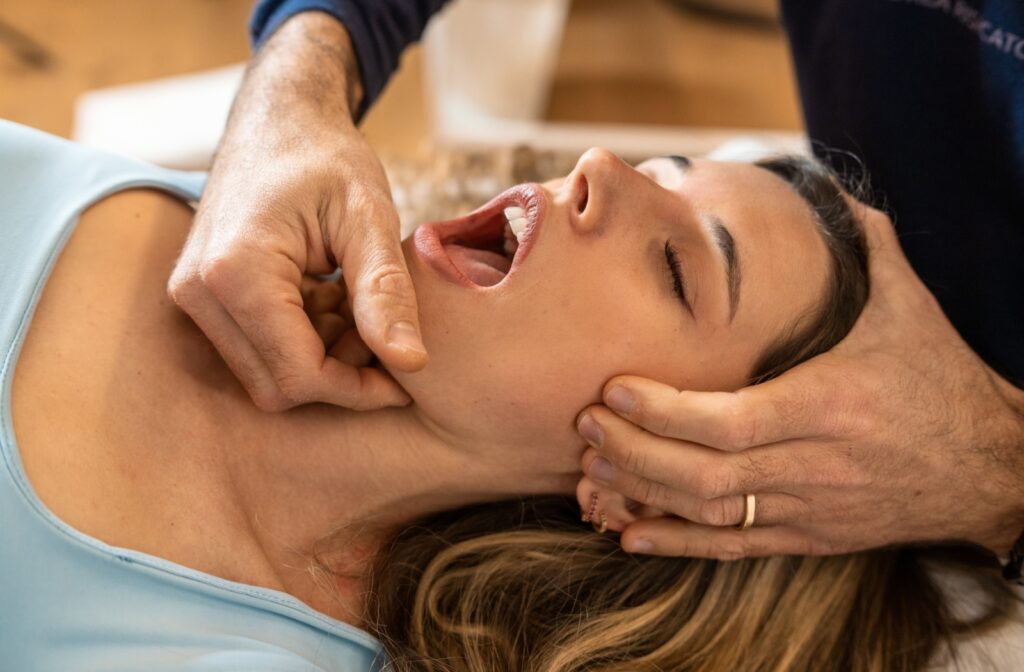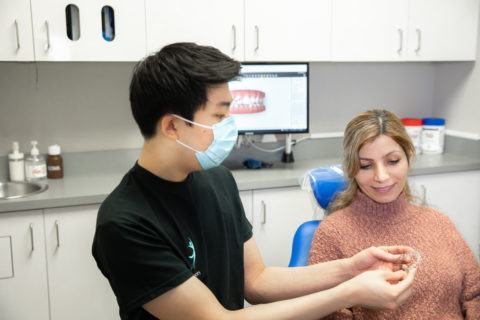
If you’ve been dealing with jaw pain, clicking sounds, headaches, or difficulty opening your mouth, you’re not alone. Temporomandibular joint (TMJ) pain and discomfort affect many people, and while it’s a common condition, many don’t realize that certain everyday habits can make TMJ worse:
- Stress
- Poor posture
- Chewing gum
- Hard or chewy foods
- Poor sleep
- Resting your chin on your hand
- Smoking
- Caffeine and alcohol
- Not using supportive devices
- Biting habits
Understanding what triggers your TMJ symptoms is the first step toward finding relief. By identifying and avoiding these common aggravators, you can take control of your jaw health and reduce the discomfort that may be impacting your daily life.
What Is TMJ?
TMJ disorder (TMD) affects the temporomandibular joint, which connects your jawbone to your skull. This joint acts like a sliding hinge, allowing you to talk, chew, and yawn. When this joint becomes inflamed or damaged, it can cause a range of uncomfortable symptoms that interfere with your quality of life.
Causes & Symptoms of TMD
TMD can develop from various factors, including jaw injuries, arthritis, teeth grinding, or structural problems with the jaw joint. Some people develop TMD after dental work or due to genetic factors that affect jaw alignment.
Common symptoms may include:
- Jaw pain or tenderness
- Clicking or popping sounds when opening or closing your mouth
- Difficulty chewing or speaking
- Jaw locking in an open or closed position
- Headaches or earaches
- Facial pain or swelling
10 Things That Worsen TMD Symptoms
If you’re dealing with persistent TMD pain, it’s worth considering some possible causes.
Stress
Stress is one of the biggest culprits behind worsening TMD symptoms. When you’re stressed, you naturally tense your jaw muscles and may clench your teeth for extended periods without realizing it. This constant tension puts extra pressure on your temporomandibular joint, leading to increased pain and inflammation.
Managing stress through relaxation techniques, regular exercise, or meditation can help reduce jaw tension and improve your symptoms.
Poor Posture
Your posture affects more than just your back—it also impacts your jaw health. Slouching, hunching over a computer, or holding your head in a forward position puts strain on your neck and jaw muscles. Misalignment can exacerbate TMD symptoms and lead to increased tension in the surrounding muscles.
Focus on maintaining good posture throughout the day by keeping your shoulders back, your head aligned over your spine, and your computer screen at eye level.
Chewing Gum
While chewing gum might seem harmless, it can be particularly problematic for people with TMD. The repetitive chewing motion overworks your jaw muscles and puts continuous stress on the joint. The constant activity can lead to muscle fatigue and increased pain.
If you enjoy having something to chew on, try switching to sugar-free mints or practice relaxation techniques instead.
Hard or Chewy Foods
Certain foods require excessive jaw work and can aggravate TMD. Hard foods like nuts, carrots, or ice cubes force your jaw to work harder, while chewy foods like taffy or tough meats can strain the joint through repetitive motion.
Instead, opt for soft foods that require minimal chewing, such as smoothies, mashed vegetables, soft fruits, and well-cooked grains and proteins like eggs or fish.
Poor Sleep
Sleep problems and TMD go hand in hand. Poor sleep quality can increase stress levels and muscle tension, while TMD can make it challenging to find a comfortable position and fall asleep. Additionally, sleeping in positions that strain your neck or jaw can worsen symptoms.
Resting Your Chin on Your Hand
This common habit, especially when working at a desk or reading, puts direct pressure on your jaw joint. The weight of your head pressing down through your hand creates unnatural stress on the temporomandibular joint and can contribute to pain and dysfunction.
Smoking
Smoking affects your body’s ability to heal and can worsen inflammation throughout your system, including in your jaw joint. The nicotine in cigarettes also increases muscle tension, which can aggravate TMD.

Caffeine & Alcohol
Both caffeine and alcohol can interfere with sleep quality and increase muscle tension. Caffeine is a stimulant that can make you more prone to jaw clenching, while alcohol can disrupt your sleep patterns and lead to teeth grinding during the night.
Not Using Supportive Devices
If your dentist has recommended a night guard or other oral appliance, not using it consistently can allow your symptoms to worsen. These devices are designed to protect your teeth and jaw joint from the harmful effects of grinding and clenching.
Biting Habits
Nail biting, pen chewing, or biting your cheeks and lips can all contribute to TMD problems. These habits create additional stress on your jaw joint and can lead to misalignment or increased tension in the surrounding muscles.
Treatment for TMD
Many TMD symptoms can be managed effectively at home with simple self-care techniques:
- Apply ice packs or warm compresses
- Practice gentle jaw exercises and stretches
- Eat soft foods and avoid triggering items
- Use over-the-counter pain relievers
- Practice stress management techniques
When to Seek Professional Treatment for TMD
If problems persist, you should consult a professional. While conservative approaches, such as mouthguards and physical therapy, are often the first line of defence, they aren’t the only solution.
Botox for TMD
Botox is an effective and minimally invasive treatment option for managing TMD. By injecting small amounts of botulinum toxin into the overactive jaw muscles, botox can help to relax the muscles, reducing tension and alleviating pain caused by clenching or grinding. Many patients find relief from symptoms such as headaches, jaw stiffness, and facial soreness within just a few days of treatment.
Your Path to TMJ Relief
Managing TMJ disorder requires a personalized approach that addresses your specific triggers and symptoms. By avoiding the habits and factors that worsen your condition, you can take significant steps toward reducing your discomfort and improving your quality of life.
At Markham Dental, we tailor each treatment to your individual needs. Working with a dental professional who understands TMD can help you develop a comprehensive treatment plan that addresses both your symptoms and their underlying causes. We administer Botox Contact our team today and don’t let TMD control your life. With the proper knowledge and professional support, you can find relief and get back to enjoying all the activities you love.
Contact details
Markham Dental General and Cosmetic Dentistry
8241 Woodbine Ave, Unit 17, Markham, ON L3R 2P1
Email: [email protected]
In Case of Emergency Call
(365) 659-4701
To schedule an appointment, please fill out the adjacent form.
Book An Appointment

Book your appointment online!




